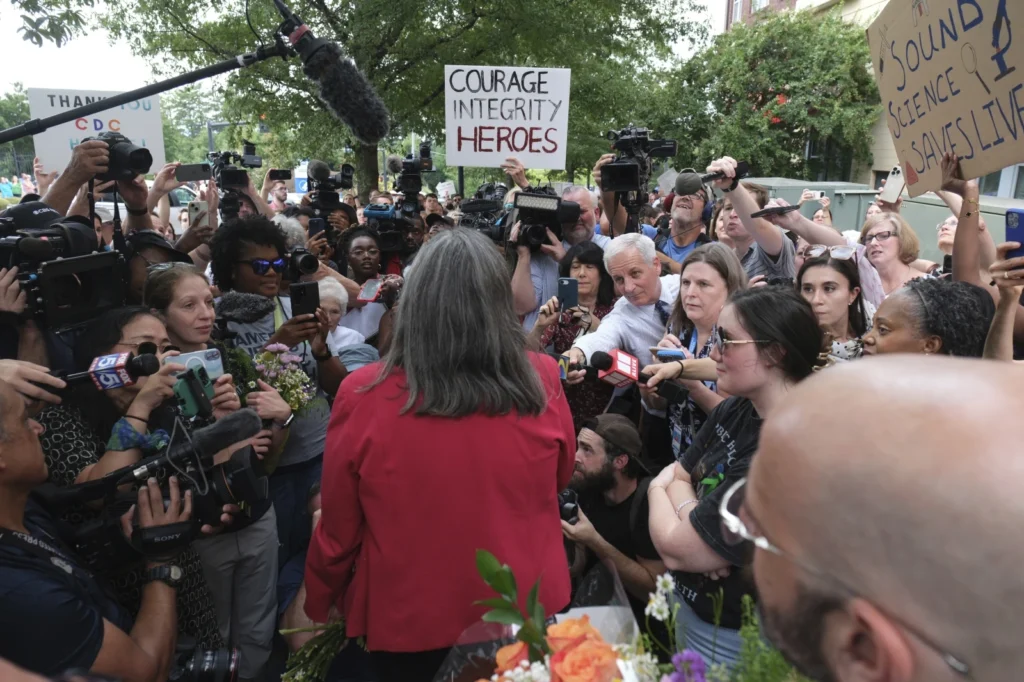The White House has forced out Centers for Disease Control and Prevention (CDC) Director Susan Monarez, less than a month after her appointment, sparking bipartisan alarm and mass resignations at the nation’s top public health agency.
Monarez, a career scientist confirmed in June, was replaced by Jim O’Neill, deputy secretary of Health and Human Services (HHS) and a former investment executive without a medical background. The decision follows escalating tensions with Health Secretary Robert F. Kennedy Jr., a prominent vaccine skeptic, whose influence over U.S. health policy has been growing under President Donald Trump’s administration.
Monarez’s ouster has triggered rare bipartisan criticism in Congress, with two Republican senators demanding oversight and several Democrats calling for Kennedy’s removal. Kennedy is scheduled to testify before lawmakers on September 4.
Clash Over Vaccine Policy
The flashpoint centers on the CDC’s Advisory Committee on Immunization Practices, which Kennedy reshaped earlier this year by dismissing its members and replacing them with vaccine skeptics. The panel is set to review longstanding childhood vaccines including shots for measles, hepatitis, and chickenpox at a September 18 meeting.
Senator Bill Cassidy (R-La.), a physician, warned that “any recommendations issued will be lacking legitimacy,” citing “serious allegations about the meeting agenda, membership, and lack of scientific process.”
Monarez Resists Political Pressure
Monarez’s lawyers said she was removed because she refused to “rubber-stamp unscientific, reckless directives and fire dedicated health experts.” Former CDC acting director Dr. Richard Besser called her “one of the last lines of defense against this administration’s dangerous agenda.”
Her dismissal prompted three senior officials—Dr. Debra Houry, Dr. Demetre Daskalakis, and Dr. Daniel Jernigan to resign in protest. Hundreds of CDC staff and supporters rallied outside the Atlanta headquarters on Thursday, chanting “USA, not RFK” as the officials departed.
“You cannot dismantle public health and expect it to still work,” said Daskalakis, warning that children’s health is at risk.
A Legacy of Turmoil
Since Trump took office, U.S. health agencies have faced turbulence, with leadership turnover, policy reversals, and public distrust mounting. The CDC, still scarred by its controversial handling of the COVID-19 pandemic, is now at the center of a deeper battle over science and politics.
Earlier this month, a gunman angered by false vaccine claims opened fire outside CDC headquarters, killing a police officer. Staff say morale has plummeted as political appointees override scientific decisions.
Monarez now holds the distinction of being the shortest-serving CDC director since the agency was founded in 1946.
What Comes Next?
It remains unclear whether O’Neill will serve permanently or in an acting capacity. Kennedy has said further shake-ups are likely, arguing that “a lot of trouble at the CDC” requires a cultural purge.
But public health leaders warn the consequences will be profound.
“The scientific community is beginning to draw a line in the sand,” said Dr. Georges Benjamin, head of the American Public Health Association. “Science must guide public health not politics.”


